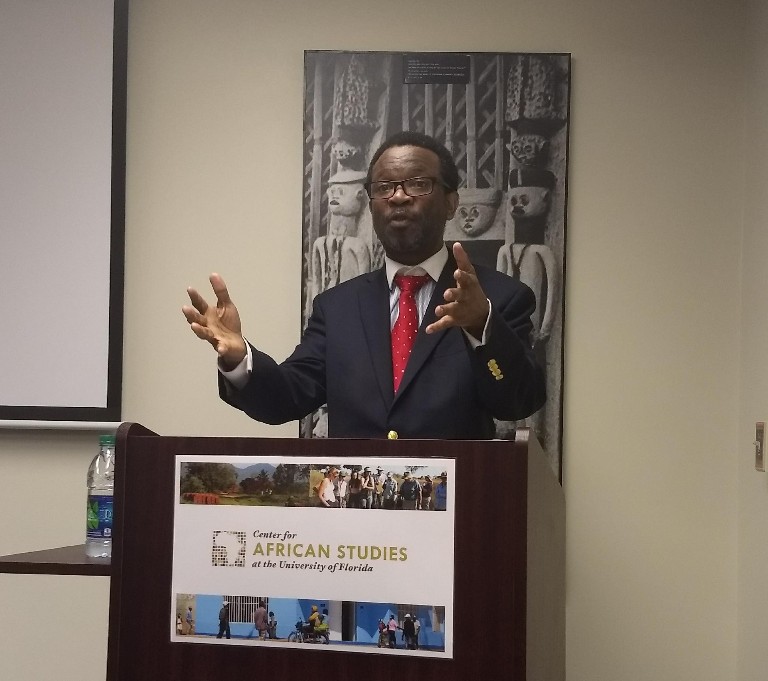 On Friday afternoon, Xolela Mangcu gave an energetic exposition of his forthcoming biography of Nelson Mandela. Mangcu is professor of sociology and visiting scholar at the Wilson Center. A supporter of the Black Consciousness Movement and long-time critic of Mandela, the self-proclaimed “unlikely biographer” described the paradoxical figure of South Africa’s first Black president. In his talk titled “Nelson Mandela: The Aristocrat and the Revolution,” Mangcu argued that biographers and analysts tend to pigeonhole Mandela as a revolutionary symbol of Black political thought, but it is, in fact, Nelson’s paradoxical role as both aristocrat and revolutionary that led to his political success.
On Friday afternoon, Xolela Mangcu gave an energetic exposition of his forthcoming biography of Nelson Mandela. Mangcu is professor of sociology and visiting scholar at the Wilson Center. A supporter of the Black Consciousness Movement and long-time critic of Mandela, the self-proclaimed “unlikely biographer” described the paradoxical figure of South Africa’s first Black president. In his talk titled “Nelson Mandela: The Aristocrat and the Revolution,” Mangcu argued that biographers and analysts tend to pigeonhole Mandela as a revolutionary symbol of Black political thought, but it is, in fact, Nelson’s paradoxical role as both aristocrat and revolutionary that led to his political success.
Mangcu asserted that most scholarship on Mandela misses Mandela’s connection to the Black elite. They paint a caricature of the “authentically African” Mandela, raised in the rural Transkei by a Chief, Jongintaba. Watching the chief preside over local disputes, Mandela supposedly developed his democratic sensibility. On the contrary, Mandela did not grow up in the village, but in mission boarding schools, a crucial part of Mandela’s past that Mangcu argued has been largely overlooked.
Not only was Mandela brought up in a Victorian environment, but also he was a member of the Thambu royal family, who were allies in indirect rule. His great grandfather was the King of Thembu, his father a member of the Bhunga, the native parliament, where chiefs came together to deliberate with colonial magistrates. Jongintaba, who raised Mandela, was even said to be among King George’s favorite chiefs. Mandela’s family saw themselves as British subjects, and even much of the African National Congress saw themselves in the same way. Up until now, Mangcu argued, Mandela’s biographers have not engaged sincerely with this element of his upbringing.
Mangcu also presented Mandela’s activities at the University of Fort Hare as a critical trajectory in Mandela’s socialization. While past biographies mention Mandela’s expulsion from Fort Hare, they say little of his experience there. Mandela belonged to the Student Christian Association; such clubs, Mangcu provocatively asserted, were like “kindergarten for Victorian values,” comparing these students to W.E.B. DuBois’ Talented Tenth. He argued that Mandela’s participation in the founding of the African National Congress Youth League in the 1940s was related to his early activities in these student organizations and the protests that led to his expulsion.
A Transkei native educated in mission schools and expellee of Fort Hare, the final paradox of Mandela was that he never experienced racism until he attended the University of Witwatersrand in Johannesburg, where he was told Black people could not be lawyers. He spent the next 40 years, including those of his imprisonment, striving for his LLB, which he eventually obtained. Mandela became so radicalized in the process that he joined and became the leading spokesperson for the ANC Youth League. His message was always tempered, however, by a tendency to appease the white ruling class. He opposed a proposed ANC action against King George and argued for Black participation in government, while the more militant ANC members pushed for a boycott of the oppressive apartheid government.
Mangcu closed by saying that the aristocrat and the revolutionary were always in tension in the person of Mandela, and that one must engage with Mandela’s history to understand this paradoxical political figure. Mandela’s history, he said finally, is the history of Black people in South Africa, and it is crucial to understanding Black political modernity in the country.